In the News
Use the Type option below to filter news (media coverage) or press releases.
The news outlet links below represent many viewpoints, aggregated here for reference purposes only. The Louisiana Office of Community Development makes no claim as to the veracity or accuracy of any views contained herein.
If you are a member of the media, please contact Marvin McGraw and indicate your name, news outlet, contact information and deadline.
CONTACT
Marvin McGraw
marvin.mcgraw@la.gov
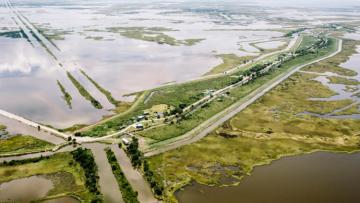
when is it time to retreat from climate change?Source: The New Yorker Date: 03/27/2017 Isle de Jean Charles, a stitch of land on the tattered southern fringe of Louisiana, is thin and getting thinner. Battered by storms and sea-level rise, and deprived of revitilizing sediment from the Mississippi River, its surface area has shrunk by ninety-eight percent since 1955, and its remaining three hundred and twenty acres can flood in... |
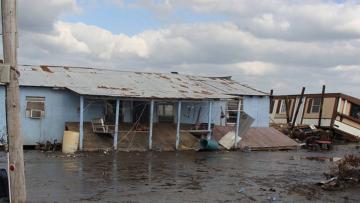
America gets its first group of climate refugeesSource: Marketplace Date: 02/01/2017 America has its political refugees and its economic refugees. And now, for the first time, it has climate refugees. |
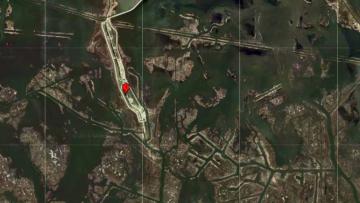
The people of Isle de Jean Charles aren't the country's first climate refugeesSource: The Lens Date: 12/06/2016 Isle de Jean Charles is endangered for the same reasons that much of coastal Louisiana has become part of the Gulf of Mexico: The land is sinking, river levees are preventing it from being replenished, oil and gas drilling accelerated erosion--and on top of that, seas are rising. |
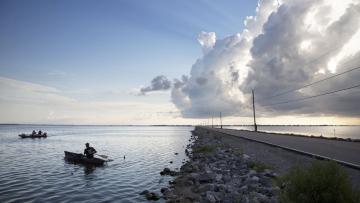
Leaving ParadiseSource: The Weather Channel Date: 11/07/2016 Thanks to a federal grant that made them the nation’s first “climate refugees,” the people of Isle de Jean Charles will be given a chance to move to higher ground, away from the rising water that threatens their two-century-old Gulf Coast community. But residents say that they only feel at home when they are near water and family... |

Washed AwaySource: Full Measure Date: 10/16/2016 A small Louisiana community is part of a groundbreaking project to relocate together at taxpayer expense |
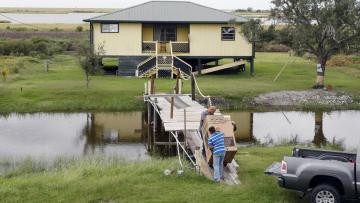
How Louisiana Is Relocating a Community Threatened by Climate ChangeSource: Curbed: Urban Planning Date: 09/29/2016 Isle de Jean Charles, Louisiana, a small coastal island in the Gulf of Mexico, is currently the site of a far-reaching experiment that may shape how the government, at every level, thinks about one of the looming issues of climate change: resettlement. |
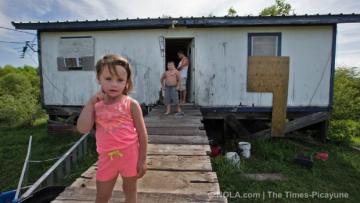
Stay or go? Isle de Jean Charles families wrestle with the seaSource: The Times-Picayune Date: 09/13/2016 The message scrawled on the whitewashed plywood sign was clear, even if it was only one man's perspective: "We are not moving off this island. If some people want to move, they can go. But leave us alone." It was signed, "Edison Jr." |
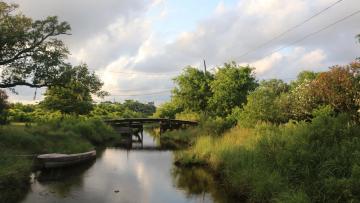
Relocating Coastal Tribe Indicates Future Challenges For LouisianaSource: WWNO Date: 09/07/2016 Sea level rise and land loss is affecting communities all over the world, not just in Louisiana. But Louisiana has one of the first communities that will be entirely resettled as a result: the Isle de Jean Charles. |
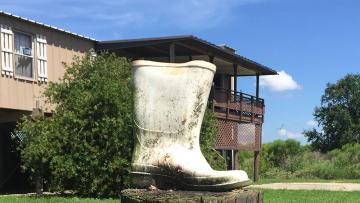
Isle De Jean Charles: Louisiana Community To Be Climate Change RefugeesSource: Sky News, UK Date: 08/30/2016 A US community is given a government grant to leave, as climate change is helping to make their homes unlivable |
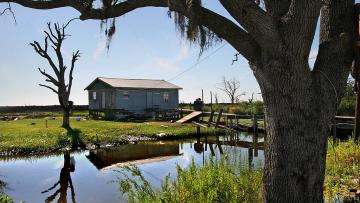
The Toughest Question in Climate Change: Who Gets Saved?Source: Bloomberg View Date: 08/29/2016 Last fall, two towns at opposite ends of the country entered a new kind of contest run by the federal government. At stake was their survival: Each is being consumed by the rising ocean, and winning money from Washington would mean the chance to move to higher ground. |
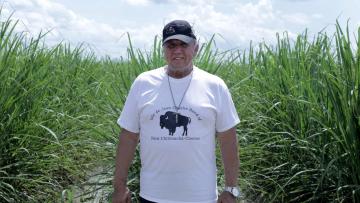
Meet the residents of Louisiana’s disappearing coastal communitiesSource: PBS NewsHour Date: 07/30/2016 Sinking land, rising seas and an increased storm surge have all contributed to coastal erosion in the bayou. Decades of construction on oil and gas canals have also played a role. |

Native community in Louisiana relocates as land washes awaySource: PBS NewsHour Date: 07/30/2016 Isle de Jean Charles in Louisiana has lost 98 percent of its land to coastal erosion caused by sinking land and exacerbated by rising seas and increased storm surges. The tribal community that lives there will be the first to receive federal tax dollars to help them relocate in response to climate change. Hari Sreenivasan reports. |
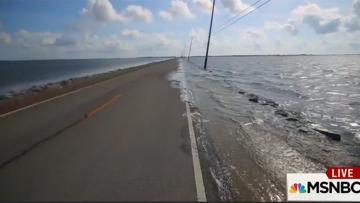
Louisiana’s Vanishing Island: America’s First Climate RefugeesSource: EcoWatch Date: 06/28/2016 Residents of a Louisiana island are among the first American climate refugees. Encroaching water is forcing them off the land they have lived on for generations. Isle de Jean Charles, Louisiana, has been inhabited by tribal communities since the Trail of Tears era. |

Louisiana Climate RefugeesSource: Yale Climate Connections Date: 06/13/2016 Roch Naquin grew up with his five brothers and sisters on the Isles de Jean Charles in Louisiana. The island supported about a hundred families of the Biloxi-Chitimacha-Choctaw tribe. |

Icebergs on the Bayou, $48 million Grant reported as 1st official US climate refugeesSource: Blasting News (UK) Date: 06/02/2016 On January 21, 2016 the U.S. Department of HUD announced the winners of its $1 Billion National Disaster Resilience Competition. The State of Louisiana and The City of New Orleans combined to receive over $233 Million. |
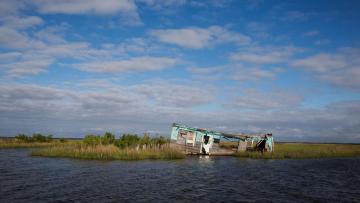
The First Official Climate Refugees in the U.S. Race Against TimeSource: National Geographic Date: 05/25/2016 A Native American tribe struggles to hold on to their culture in a Louisiana bayou while their land slips into the Gulf of Mexico. |
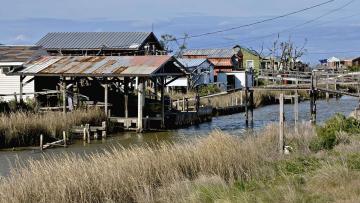
Tiny Louisiana Community Is Rapidly Vanishing Due to Rising SeasSource: HowStuffWorks Date: 05/24/2016 The people of Isle de Jean Charles have lived off the waters surrounding their small Louisiana town for nearly two centuries now. Soon the waters will take the town from them. |

Native Americans' Relocation From Louisiana Home: 'First Climate Change Refugees'Source: WWNO-NPR: Weekend Edition Saturday Date: 05/14/2016 Members of a Native American community in south Louisiana are retreating from their coastal home and trying to preserve their culture in the process. |
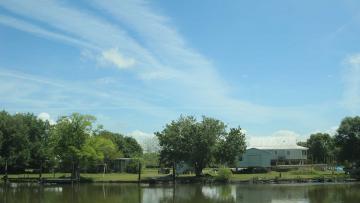
Chased from home by climate changeSource: OXFAM America Date: 05/10/2016 Southeast Louisiana is in the news once again—not for a hurricane or a flood this time, but for efforts to protect communities dealing with the blows of these disasters, along with the impacts of climate change. |
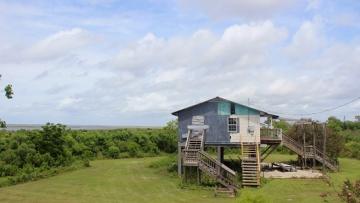
Preservation in Print April 2016: Coastal ResilienceSource: Preservation Resource Center of New Orleans Date: 05/05/2016 Wenceslaus Billiot stands on his front porch on the Isle de Jean Charles in Terrebonne Parish. Water laps at the base of a small levee 20 feet from the back door of his home, which sits perched on pilings 11 feet above a manicured lawn. |

US Spends Nearly $50 Million To Relocate First American Climate RefugeesSource: Tech Times Date: 05/04/2016 Climate change, particularly unprecedented sea level rise, is already creating refugees in the United States. |

First US climate refugees get $48 million to moveSource: Christian Science Monitor Date: 05/03/2016 A first-of-its-kind, $48 million federal grant aims to move the entire community of the sinking Isle de Jean Charles, La., to a drier place. |
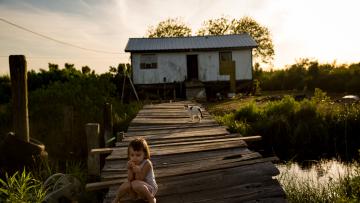
Resettling the First American Climate RefugeesSource: New York Times Date: 05/02/2016 A $48 million grant for Isle de Jean Charles, La., is the first allocation of federal tax dollars to move an entire community struggling with the effects of climate change. |

Who gets to move off the island? Local American Indian tribes disagreeSource: Houma Courier/Daily Comet Date: 04/23/2016 Delegates from an American Indian tribe living on Isle de Jean Charles and state officials disagree over how to spend millions of dollars intended to move the island's residents away from the encroaching Gulf of Mexico. |

Isle de Jean Charles tribe looks at moving entire community north in first-of-its-kind test caseSource: The Advocate Date: 04/09/2016 Looking out from the house he built in 1959 with lumber brought by boat to this island at the south end of Terrebonne Parish, Wenceslaus Billiot remembers when the view from his back porch was thick forest and solid marsh. |
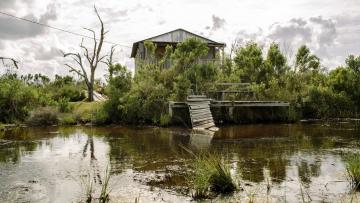
'There's no more land'Source: CNN Date: 04/08/2016 Wenceslaus Billiot, an 89-year-old with suede-soft eyes and a bayou-French accent, asked me to follow him onto the second-story balcony of his stork-legged house here in the southern Louisiana marshland. |
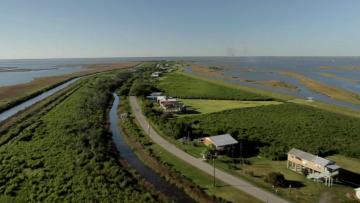
Native Community Will Move to Higher Ground in LouisianaSource: Triple Pundit Date: 04/04/2016 A native community in southern Louisiana hopes to make a historic move to higher ground, now that it has received a major federal grant for relocation. Awaiting finalization from the state, the tribe hopes to relocate within the next few years. |
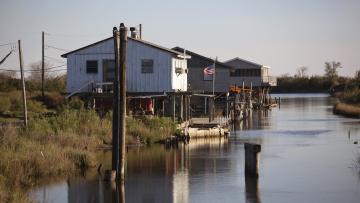
The lucky ones: Native American tribe receives $48m to flee climate changeSource: The Guardian Date: 03/23/2016 In Louisiana, the Biloxi-Chitimacha-Choctaw tribe has been awarded a natural disaster grant to resettle away from their sinking land. But other indigenous Americans have no way out |
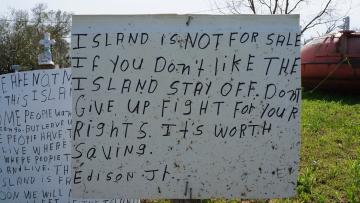
The First U.S. Climate RefugeesSource: Bloomberg View Date: 03/20/2016 Early one morning at the beginning of March, two black Chevy Suburbans filled with federal and state development officials left New Orleans for Louisiana's coast. Almost two hours later, they turned onto Island Road, a low spit of asphalt nearly three miles long with water on either side. |

Native American tribe to relocate from Louisiana coast as sea levels riseSource: Reuters News Service/reprinted in Baton Rouge Business Report Date: 03/17/2016 A small Native American community in coastal Louisiana is to be resettled after losing nearly all its land partly due to rising seas, a first in the United States. |
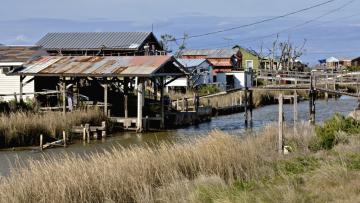
Rising sea levels force U.S. to resettle Native American tribeSource: PBS News Hour Date: 03/17/2016 A Native American tribe located in coastal Louisiana will become the first community in U.S. history to be relocated due, in part, to rising sea levels, said Marion McFadden, a spokeswoman for the U.S. Department of Housing and Urban Development, on Thursday. |
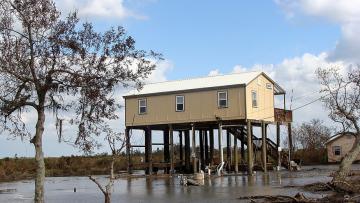
Native American Tribe Gets Federal Funds to Flee Rising SeasSource: Inside Climate News Date: 03/16/2016 In a disappearing section of Louisiana coastline, the people who call Isle De Jean Charles home are moving to save their community and culture. |
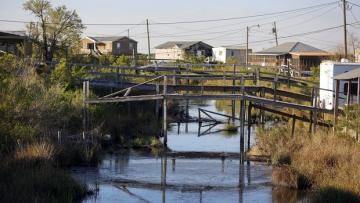
Louisiana's vanishing island: the climate 'refugees' resettling for $52mSource: The Guardian Date: 03/15/2016 Wenceslaus Billiot, an 88-year-old native of Isle de Jean Charles, Louisiana, remembers growing up on a much different island than the two-mile sliver of his ancestral home that remains today. |
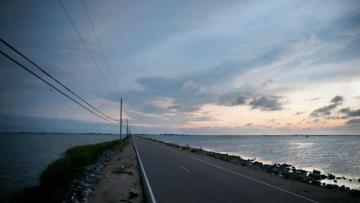
Louisiana Tribe Officially Becomes America's First Climate RefugeesSource: Weather.com Date: 02/22/2016 French-speaking Indians who live deep in Louisiana bayou, some 50 miles south of New Orleans, became the United States' first official climate refugees last week when the federal government awarded them $48 million to relocate. |
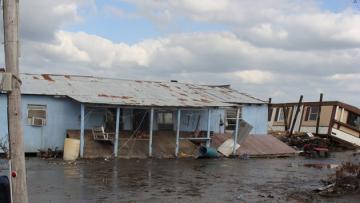
A Louisiana Tribe Is Now Officially A Community Of Climate RefugeesSource: Huff Post Science Date: 02/12/2016 Deep in the bayous of Louisiana, about 80 miles southwest of New Orleans, lies the Isle de Jean Charles, a tiny swath of land that’s all but vanished into the Gulf of Mexico. |